 Let's not allow the old year to pass without a final (I hope!) round of updates to the Big Blogroll O' Vark®™©. We'll add three, change four, and delete two. If my advanced arithmetic powers have not escaped me, this gives us a net gain of one blog this time around.
Let's not allow the old year to pass without a final (I hope!) round of updates to the Big Blogroll O' Vark®™©. We'll add three, change four, and delete two. If my advanced arithmetic powers have not escaped me, this gives us a net gain of one blog this time around.To find out more about the BBOV and the benefits of listing each others' blogs, please read the first three links under Aurous Effluence in the sidebar. Those who'd like the Big Blogroll O' Vark®™© can either email me or copy the list from the Alley's source code (click View | Page Source or Control+U in Firefox or View | Source in Internet Explorer).
Good Things Happen in Threes
We welcome Concordia: The Lutheran Confessions to the Lutheran blogosphere. Of course, the Lutheran Confessions are de facto part and parcel of our blogging, but now there's a high powered site dedicated to in depth study of their content. Concordia is an extension of the excellent public domain resource for the Confessions, The Book of Concord online site.
Our next addition is Susan B's Lilac Rose. This blog's been around for several years. I think she was on hiatus when I started the Alley and missed being included in the original BBOV. I'm happy to report that this oversight has been corrected.
Northwoods Seelsorger is our final new site. Pastor Don Engebretson, an aptly self-described "carer of souls," provides a nice blend of depth with ease of reading.
Change Four, for Crying Out Loud
The following have altered their addresses and, in one instance the name. Please change the URLs for Balaam's Ass, the Old School Confessional, and Jason Evans' TheologyGeekBlog. Meanwhile, Jason Peterson has stopped adding to Ranting No More and begins anew with Theology from the Inverted Mind of a Lutheran.
Two Gone, Too Bad
Please say farewell to Life of Michael and to the short-lived (but already missed) These Curious Minds.
For these and all others enrolled in the BBOV, links back are certainly appreciated. And don't forget that all of those listed benefit when you use the entire blogroll. Also, if you'd like to graphically point to the Alley and the Big Blogroll O' Vark®™©, you may use the above design from St. Charles Place or one of these blog buttons:
Finally, if you own or know of a Lutheran blog demonstrating a quia confessional subscription and would like me to consider it for inclusion, please leave a comment. And again, for more information about why this stuff benefits confessional Lutheran blogging, morality, and other worthwhile things, please check out the first three links under Aurous Effluence in the sidebar.
Technorati Tags: Aardvark Alley | Big Blogroll O' Vark | BBOV | blogroll | blog roll | Lutheran | confessional Lutheran
 David, son of Jesse, went from tending his father's flocks to being the greatest of Israel's kings. He ruled from about 1010 to 970 B.C. He was chosen by the Lord and anointed by Samuel to replace the apostate King Saul, for whom David had provided years of faithful service. The events of his life are found from 1 Samuel 16 through 1 Kings 2 and in 1 Chronicles 10 through chapter 29. David's son Solomon succeeded him as king.
David, son of Jesse, went from tending his father's flocks to being the greatest of Israel's kings. He ruled from about 1010 to 970 B.C. He was chosen by the Lord and anointed by Samuel to replace the apostate King Saul, for whom David had provided years of faithful service. The events of his life are found from 1 Samuel 16 through 1 Kings 2 and in 1 Chronicles 10 through chapter 29. David's son Solomon succeeded him as king.David was also gifted musically. Skilled in playing the lyre, he wrote at least seventy-three of the Psalms, including the beloved Psalm 23 and several Messianic prophecies, including the foreshadowing of Christ's crucifixion in Psalm 22.
David's public and private character displayed a mixture of good, for example, his defeat of the giant Goliath, (1 Samuel 17) and evil, as in his adultery with Bathsheba, Uriah's wife, followed by his murder of Uriah, (2 Samuel 11). David's greatness lay in his fierce loyalty to God as Israel's military and political leader. For example, under his leadership, the people of Israel were united into a single nation with Jerusalem as the capital city.
This devotion to the Lord and to the people was coupled with his willingness to acknowledge his sins and ask for God's forgiveness (2 Samuel 12). The great penitential outpouring of Psalm 51 came as a result of his sins against Uriah, as did the thoughts and emotions expressed in Psalm 32.
David's standing before the Lord and his place in the Messianic line are mentioned in many places. Of all of these, Paul's words in Acts 13:22-23 provide a fitting summary: "[The Lord] raised up David to be their king, of whom he testified and said, 'I have found in David the son of Jesse a man after my heart, who will do all my will.' Of this man's offspring God has brought to Israel a Savior, Jesus, as he promised."
Technorati Tags: King David | David | prophet | Israel | King Saul | Samuel | Messianic prophecy | Solomon | Goliath | Bathsheba | Uriah | Psalms | psalmist | Messiah | faithfulness | penitence | Law and Gospel | grace
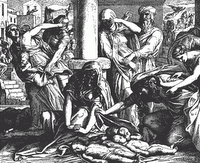 This day commemorates the slaughter of Bethlehem's children by Herod the Great (Matthew 2:16-18), as he attempted to destroy the Usurper to his throne.
This day commemorates the slaughter of Bethlehem's children by Herod the Great (Matthew 2:16-18), as he attempted to destroy the Usurper to his throne.Herod, his jealousy inflamed by the account given by the Wise Men (Matthew 2:7), sent his soldiers to kill all the town's boys two years old and younger in order to protect his throne and lineage. This was one of the last major decisions made in a life filled with vainglory and increasing insanity.
 The commemorations of Stephen, John, and the Innocents remind us that not all receive the Gift of Christmas with joy. However, God's plan of salvation spreads in spite of hatred. Even today, much of the world actively rejects the Gospel and persecutes those who preach and live it.
The commemorations of Stephen, John, and the Innocents remind us that not all receive the Gift of Christmas with joy. However, God's plan of salvation spreads in spite of hatred. Even today, much of the world actively rejects the Gospel and persecutes those who preach and live it.Yet through all the years, the Church has continued to proclaim Christ — Christ incarnate, Christ crucified, Christ resurrected, Christ ascended, Christ returning. The very resistance of the Devil, the hard-hearts of others, and the testimony of our own sinful natures all provide ample evidence of the world's desperate need for His forgiveness. God grant that we faithfully believe and steadfastly confess this saving message, the Good News of forgiveness of sins in Christ Jesus.
Lection
Psalm 54
Jeremiah 31:15-17
Revelation 14:1-5
Matthew 2:13-18
Collect
Almighty God, the martyred innocents of Bethlehem showed forth Your praise not by speaking but by dying. Put to death in us all that is in conflict with Your will that our lives may bear witness to the faith we profess with our lips; through Lord Jesus, our Christ, who lives and reigns with You and the Holy Spirit, one God, now and forever.
Technorati Tags: Holy Innocents | Herod the Great | King Herod | Herod | Magi | Wise Men | Bethlehem | Jesus | Mary | Joseph
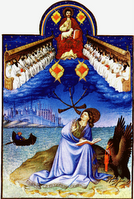 Saint John, Apostle and Evangelist, a son of Zebedee, was one of the twelve apostles. With his brother James and Simon Peter, he formed an inner circle among the Twelve: Those three beheld the Great Catch of Fish (Luke 5:10), the healing of Peter's mother-in-law (Mark 1:29-31), the raising of Jairus' daughter(Mark 5:37; Luke 8:51), the Transfiguration (Matthew 17:1; Mark 9:2; Luke 9:28), and Gethsemane's agony (Matthew 26:37; Mark 14:33).
Saint John, Apostle and Evangelist, a son of Zebedee, was one of the twelve apostles. With his brother James and Simon Peter, he formed an inner circle among the Twelve: Those three beheld the Great Catch of Fish (Luke 5:10), the healing of Peter's mother-in-law (Mark 1:29-31), the raising of Jairus' daughter(Mark 5:37; Luke 8:51), the Transfiguration (Matthew 17:1; Mark 9:2; Luke 9:28), and Gethsemane's agony (Matthew 26:37; Mark 14:33).He expressed willingness to undergo martyrdom (Matthew 20:22; Mark 10:39) — as did the other apostles (Matthew 26:35; Mark 14:31). However, ancient testimony says that even though he was imprisoned and exiled, he was eventually released and died a natural death in Ephesus.
According to Mark 3:17, Jesus gave James and John "the name Boanerges, that is, Sons of Thunder." He is credited with the writing three epistles and one Gospel. He is also the probable author of Revelation, although this identification is less certain.
His symbol in ecclesiastical art is usually the eagle.
Lection
Psalm 11
Revelation 1:1-6
1 John 1:1-2:2
John 21:20-25
Collect
Merciful Lord, cast the bright beams of Your light upon Your Church that we, being instructed in the doctrine of Your blessed apostle and evangelist Saint John, may come to the light of everlasting life; for You live and reign with the Father and the Holy Spirit, one God, now and forever.
Technorati Tags: Saint John | St. John | John | eagle | Sons of Zebedee | Boanerges | Sons of Thunder | Jesus | apostle | evangelist | Gospel | Saint James | Saint Peter
 The days following Christmas are sometimes called the "Witness Days." The Greek word for "witness" is "martyr," and these days remind us that this sinful world hates the Gospel message of forgiveness in Christ Jesus.
The days following Christmas are sometimes called the "Witness Days." The Greek word for "witness" is "martyr," and these days remind us that this sinful world hates the Gospel message of forgiveness in Christ Jesus.Saint Stephen's Day remembers the first recorded martyr of the Church. Stephen knew the gift of Christmas: His Lord came in human flesh to bring forgiveness and as Jesus forgave His killers, so Stephen forgave those whose stones smashed away his life. The account of his calling, witness, and death is in Acts 6:1-8:2. Notice how closely the martyr's responses echo those of His Savior as each approached death.
In art, Stephen is often represented by the stones which took his life and by the palm branch, an ancient symbol of triumph and, especially in Christianity, of martyrdom. Both stones and branch are prominent in this Carlo Crivelli painting from the Demidoff Altarpiece.
Stephen's feast day supposedly occasioned of a great act of charity by the later martyred Wenceslaus, Kníze of Bohemia. Wenceslaus (or Václav) is remembered in the carol Good King Wenceslaus.
Lection
Psalm 119:137-144
2 Chronicles 24:17-22
Acts 6:8-7:2a, 51-60
Matthew 23:34-39
Collect
Heavenly Father, in the midst of our sufferings for Christ grant us grace to follow the example of the first martyr, Stephen, that we may also look to the One who suffered and was crucified on our behalf and pray for those who do us wrong; through our Jesus Christ, our Lord, who lives and reigns with You and the Holy Spirit, one God, now and forever.
Technorati Tags: Saint Stephen | St. Stephen | Jesus Christ | Jesus | Christ | martyr | Protomartyr | martyrdom | deacon | biblical history | New Testament | church history | Christianity | Advent | church calendar | Church Year | Good King Wenceslaus | Wenceslaus | Wenceslas | Václav
I'll be taking a few days off this week. The upcoming commemorations for Saint Stephen, Saint John, and the Holy Innocents will be posted now.
The Word became flesh and dwelt among us ... full of grace and truth. John 1:14 ESV
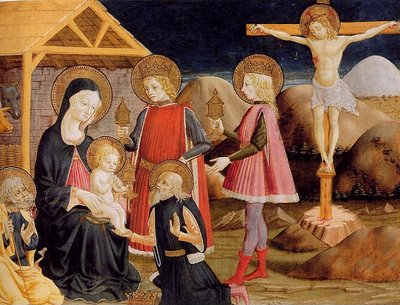
Technorati Tags: Christmas | Xmas | X-mas | Merry Christmas
20061224 Bible Study for the Day — Isaiah 24-25
Advent & and Christmas in Kenya
Away in a Manger
Christ Is Born Today!
Christmas
Christmas
Christmas?
Christmas: Blog Break
Christmas Break
A Christmas Card
Christmas Carol: The Bores Heed in Hand
The Christmas Custom
Christmas Day: Thanksgiving For Christ's Incarnation
Christmas Eve
Christmas Eve '05
Christmas Greetings
Christmas Sermons
The Christmas Story
Christmas Truce 1914
Christus Natus Est
Church Closes Nativity "Box"
Church Growth — the Real Way
A Concordia Christmas
The Days of Christ and the Days of Our Lives
For Unto Us a Child Is Born
Fulfilling the Promise
Gift Wrapping Tips for Men 101
Glad Tidings of Great Joy
God Is Pleased with Men
In Weakness Is God's Strength
It's Beginning to Look a Lot Like Christmas
May All Your Christmases Be White ... or Is It Christmas' ... or Christmasi?
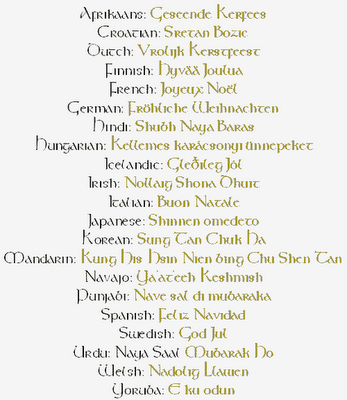
Merry Christ-mass
Merry Christmas
Merry Christmas
Merry Christmas
Merry Christmas
Merry Christmas
Merry Christmas
Merry Christmas
Merry Christmas
Merry Christmas!
Merry Christmas!!
Merry Christmas to All
A More Realistic Nativity
The Nativity of Our Lord
The Nativity of Our Lord, December 25, 2006, Luke 2:1-20
Nativity Thoughts
No Sorrow Allowed
O Admirabile Commercium
On the Nativity of Our Lord
Putting the "X" Back in Xmas
The Reason for the Season
The Rescue
St. Luke 2:1-20 — Christmas Eve 2006
Seasonal Math: Christ + Mass = Christmas
Silent Night
The Story of Baby Jesus
A Time for Everything
A Tragedy
Veiled in Flesh
A Very Blessed and Merry Christmas
Was not His Pity Towards Thee Wondrous High?
Welcome — A Poem for Christmas Night
Technorati Tags: Christmas | Xmas | X-mas | Merry Christmas
(Merry Christmas!)
(Merry Christmas!)
(Merry Christmas!)
(Merry Christmas!)
(Merry Christmas!)
(Merry Christmas!)

(Merry Christmas!)
(Merry Christmas!)
(Merry Christmas!)
(Merry Christmas!)
(Merry Christmas!)
(Merry Christmas!)
(Merry Christmas!)
Technorati Tags: Christmas | Xmas | X-mas | Merry Christmas
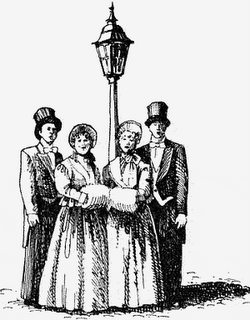
Technorati Tags: Christmas | Xmas | X-mas | Merry Christmas
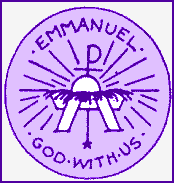 We now arrive at the seventh and final O Antiphon, including Latin text and English translation, a Latin hymn stanza, and the English versification from the hymn known as Oh, Come, Oh, Come, Emmanuel.
We now arrive at the seventh and final O Antiphon, including Latin text and English translation, a Latin hymn stanza, and the English versification from the hymn known as Oh, Come, Oh, Come, Emmanuel.O Emmanuel, Rex et legisfer noster, expectatio gentium, et Salvator erum: veni ad salvandum nos, Domine Deus noster.
O Emmanuel, God with us, Our King and Lawgiver, the expected of the nations and their Savior: Come to save us, O Lord our God. Amen.
"Therefore the Lord himself will give you a sign. Behold, the virgin shall conceive and bear a son, and shall call his name Immanuel." (Isaiah 7:14). See also Isaiah 8:6-8; Matthew 1:23; Haggai 2:7 (KJV).
Veni Veni, Emmanuel Captivum solve Israel,
Qui gemit in exsilio, Privatus Dei Filio.
Oh, come, oh, come, Emmanuel, And ransom captive Israel,
That mourns in lonely exile here Until the Son of God appear.
Rejoice! Rejoice! Emmanuel Shall come to you, O Israel!
Read the final daily meditation on the O Antiphons, posted by Pr. Bill Cwirla.
Previous posts in the series:
† Introduction to the O Antiphons
† O Sapientia — O Wisdom
† O Adonai — O Lord and Ruler
† O Radix Jesse — O Root of Jesse
† O Clavis David — O Key of David
† O Oriens — O Dayspring
† O Rex Gentium — O King of the Nations
Unless otherwise noted, Scriptures are quoted from the ESV®
Technorati Tags: Advent | O Antiphons | Oh, Come, Oh, Come, Emmanuel | O Emmanuel | O Immanuel | O Emanuel | O God with Us | God with Us | Lawgiver | King | Savior
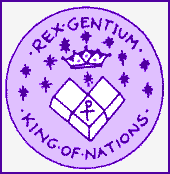 This brings us to the sixth O Antiphon, including Latin text and English translation, a Latin hymn stanza, and the English versification from the hymn known as Oh, Come, Oh, Come, Emmanuel.
This brings us to the sixth O Antiphon, including Latin text and English translation, a Latin hymn stanza, and the English versification from the hymn known as Oh, Come, Oh, Come, Emmanuel.O Rex gentium, et desideratus earum, lapisque angularis, qui facis utraque unem: veni, et salva hominem, quem de limo formasti.
O King of the Nations and their desired One, the Cornerstone that makes both one: Come, and deliver man, whom you formed out of the dust of the earth. Amen.
"For to us a child is born, to us a son is given; and the government shall be upon his shoulder, and his name shall be called Wonderful Counselor, Mighty God, Everlasting Father, Prince of Peace. (Isaiah 9:5)" Also, "He shall judge between the nations, and shall decide disputes for many peoples; and they shall beat their swords into plowshares, and their spears into pruning hooks; nation shall not lift up sword against nation, neither shall they learn war anymore. (Isaiah 2:4)." See also Revelation 15:3; Psalm 118:22; Isaiah 28:16; Matthew 21:42; Mark 12:10; Luke 20:17; Acts 4:11; Ephesians 2:19-21; 1 Peter 2:6.
Veni, Veni, Rex Gentium, Veni, Redemptor omnium,
Ut salvas tuos famulos Peccati sibi conscios.
Oh, come, Desire of nations, bind In one the hearts of all mankind;
Oh, bid our sad divisions cease, And be Yourself our King of Peace.
Rejoice! Rejoice! Emmanuel Shall come to you, O Israel!
Read the daily meditation based on this antiphon, posted each morning by Pr. Bill Cwirla.
Scripture quoted from the ESV®
Technorati Tags: Advent | O Antiphons | Oh, Come, Oh, Come, Emmanuel | O Rex Gentium | O King of the Nations | Desire of Nations | King of Peace | Cornerstone
Ask the Pastor takes off on many folks' pet peeves concerning Christmas and some of its attending attitudes and activities. He then suggests that Christians might be doing well to be Putting the "X" Back in Xmas.
Technorati Tags: Christmas | Xmas | X-mas | Ask the Pastor
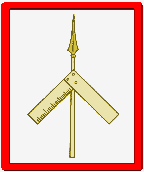 The Apostle Thomas (Hebrew or Aramaic for "twin") was also called Didymus (Greek for "twin"); either his parents gave him a most peculiar name or else he consistently went by his nickname.
The Apostle Thomas (Hebrew or Aramaic for "twin") was also called Didymus (Greek for "twin"); either his parents gave him a most peculiar name or else he consistently went by his nickname.Absent when the Risen Lord appeared to the other apostles on the evening of Easter Day, He refused to believe that Christ had indeed risen until he had seen him for himself. When he saw Him the following week, he said to Jesus, "My Lord and My God." Because of this, he has been known ever since as "Doubting Thomas," although "Disbelieving Thomas" or even "Faithless Thomas" probably would be more accurate. See John 20:19-29 for the full account.
We also remember his earlier words, when Jesus announced His intention of going to Jerusalem, even though His life was in danger there: Thomas said to the others, "Let us also go, that we may die with him." (John 11:7-16) Thus, we see that Thomas was sturdily loyal. At the Last Supper, Jesus said: "In my Father's house are many rooms. If it were not so, would I have told you that I go to prepare a place for you? And if I go and prepare a place for you, I will come again and will take you to myself, that where I am you may be also. And you know the way to where I am going." Thomas was the one who responded, "Lord, we do not know where you are going. How can we know the way?" To this Jesus answered: "I am the way, and the truth, and the life. No one comes to the Father except through me. (see John 14:1-6)"
John 21 records Thomas as one of the seven disciples fishing on the Sea of Galilee when the Lord appeared to them. Aside from these Biblical accounts, he appears only as a name on lists of the Apostles.
A few centuries later, a story circulated in the Mediterranean world that he went to preach in India; a community in the Kerala district claims descent from Christians converted by the preaching of Thomas. Among Indian Christians, tradition claims that Thomas was speared to death near Madras, and accordingly is often pictured holding a spear. Since he was credited with the building up of the Church through his missionary journeys, a carpenter's square also is a regular symbol of the apostle.
Lection
Psalm 126
Habakkuk 2:1-4
Hebrews 10:35-11:1
John 14:1-7 or 20:24-29
Collect
Almighty and everliving God, who upheld and strengthened Your apostle Thomas with sure and certain faith in Your Son's resurrection, grant us perfect and unwavering belief in Jesus Christ, our resurrected Lord and God, that our faith may never be found wanting in Your sight; through this same Jesus Christ, who lives and reigns with You and the Holy Spirit, one God, now and forever.
Technorati Tags: Saint Thomas | St. Thomas | Doubting Thomas | Jesus Christ | Jesus | Christ | apostle | disciple | biblical history | New Testament | church history | Christianity | Advent | church calendar | Church Year
 Read here the fifth of the seven O Antiphons, with Latin text and English translation, a Latin hymn stanza, and the English versification from the hymn known as Oh, Come, Oh, Come, Emmanuel.
Read here the fifth of the seven O Antiphons, with Latin text and English translation, a Latin hymn stanza, and the English versification from the hymn known as Oh, Come, Oh, Come, Emmanuel.O Oriens, splendor lucis aeternae, et sol justitiae: veni, et illumina sedentis in tenebris, et umbra mortis.
O Dawn of the East, brightness of light eternal, and Sun of Justice: Come, and enlighten those who sit in darkness and in the shadow of death. Amen.
"The people who walked in darkness have seen a great light; those who dwelt in a land of deep darkness, on them has light shined." (Isaiah 9:2). See also Luke 1:78-79; Malachi 4:2.
Veni, Veni O Oriens, Solare nos adveniens,
Noctis depelle nebulas, Dirasque mortis tenebras.
Oh, come, our Dayspring from on high, And cheer us by your drawing nigh,
Disperse the gloomy clouds of night, And death's dark shadows put to flight.
Rejoice! Rejoice! Emmanuel Shall come to you, O Israel!
Continue by reading today's meditation by Pr. Bill Cwirla.
Scripture quoted from the ESV®
Technorati Tags: Advent | O Antiphons | Oh, Come, Oh, Come, Emmanuel | O Oriens | O Dayspring | Dayspring from on High | O Dawn of the East | O Rising Dawn
The Designated Knitter smacked another Line Drive Down the Right side. She figured out the commonality between the comedian and the carnival and began her answer by saying I want to be like Jack Benny when I grow up. DK, you may pick up your new Aardie (to keep your old Aardie company) whenever you like.
OK, I won't make you read her brief post, but it would be nice of you. The answer, in simplest terms, relates to the fact that XXXIX equals 39.
Technorati Tags: Lutheran Carnival | blog carnival | Lutheran | confessional Lutheran | Jack Benny | Golden Aardvark | thirty-nine | 39 | XXXIX | Line Drive Down the Right Side
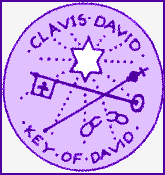 This is the fourth of the seven O Antiphons, with Latin text and English translation, a Latin hymn stanza, and the English versification from the hymn known as Oh, Come, Oh, Come, Emmanuel.
This is the fourth of the seven O Antiphons, with Latin text and English translation, a Latin hymn stanza, and the English versification from the hymn known as Oh, Come, Oh, Come, Emmanuel.O Clavis David, et sceptrum domus Israel: qui aperis, et nemo claudit; claudis, et nemo aperit: veni et educ vinctum de domo carceris, sedentem in tenebris, et umbra mortis.
O Key of David, and Sceptre of the House of Israel, who opens and no man shuts, who shuts and no man opens: Come, and bring forth the captive from his prison, he who sits in darkness and in the shadow of death. Amen.
"I will place on his shoulder the key of the house of David. He shall open, and none shall shut; and he shall shut, and none shall open." (Isaiah 22:22), and "Of the increase of his government and of peace there will be no end, on the throne of David and over his kingdom, to establish it and to uphold it with justice and with righteousness from this time forth and forevermore. The zeal of the Lord of hosts will do this." (Isaiah 9:7). See also Revelation 3:7.
Veni, Clavis Davidica, regna reclude caelica,
fac iter tutum superum, et claude vias inferum.
Oh, come, O Key of David, come, And open wide our heav'nly home;
Make safe the way that leads on high, And close the path to misery.
Rejoice! Rejoice! Emmanuel Shall come to you, O Israel!
Read the meditation by Pr. Bill Cwirla.
Scripture quoted from the ESV®
Technorati Tags: Advent | O Antiphons | Oh, Come, Oh, Come, Emmanuel | O Clavis David | O Key of David
 Financial and marital circumstances led Katharina von Bora's (b.1499) parents to place her in a convent when she was but a child of five. In 1515, she became a nun. Later, she and some of her associates heard clear proclamation of Gospel through the Lutheran Reformation and soon found their beliefs changing.
Financial and marital circumstances led Katharina von Bora's (b.1499) parents to place her in a convent when she was but a child of five. In 1515, she became a nun. Later, she and some of her associates heard clear proclamation of Gospel through the Lutheran Reformation and soon found their beliefs changing.Convinced that the vows they had taken were contrary to God's word, Katharina joined eight other nuns who desired to renounce the cloistered life. In April 1523 they were rescued from the convent and smuggled away to Wittenberg among empty herring barrels. Martin Luther and his associates helped some of these women return to their former homes while placing others with good families. Most of them were soon married.
However, Luther and friends found that dealing with "Katie" was no easy task. She rejected a number of prospective husbands, finally declaring that she'd marry either Martin or Nikolaus von Amsdorf — and nobody else. While he worried that a violent death would soon part him from any bride, Martin gave in to the stubborn young woman. They were married on 13 June 1525. Their happy marriage was blessed with six children. Katie skillfully managed the Luther household, which seemed to grow ever larger because of his generous hospitality.
Martin and Katie certainly butted heads at times. Perhaps that's why Luther sometimes called her kette (chain). However, the reformer truly adored his bride, also naming her "my Rib" and "my lord Katie." The freedom and joy that he experienced in his marriage received testimony from his 1535 Commentary on Galatians, which Luther lovingly called, "My Katie von Bora."
After Martin's death in 1546, Katie remained in Wittenberg. Sadly, she lived most of her remaining years in poverty. Her 1552 death came after an accident she suffered while traveling with her children to Torgau in order to escape the plague.
Katharina Luther remains a wonderful example of godly womanhood, beautifully portraying the "excellent wife" celebrated in Proverbs 31:10-31.
For more on Katie Luther, you might visit the online exhibit at Concordia Historical Institute. Also, please see the commemorative hymn stanza at Ask the Pastor.
Lection
Psalm 128
Proverbs 31:10-31 or 31:10-12, 17, 20, 23, 25-31
1 Corinthians 7:1-9
John 3:25-30
Collect
Dear heavenly Father, You establish marriage to bless and benefit all mankind and to testify to the world of the marriage of Christ and His Bride the Church. Grant that, as You led Katharina von Bora to become the wife of Martin Luther and, through her, blessed not only him but all Christendom, so You would also seal and protect marriages in our day, that families, society, and Church would be strengthened, stabilized, and nurtured until You call us to the wedding feast of the Lamb in His kingdom, which has no end; through this same Bridegroom, our Lord Jesus Christ, who lives and reigns with You and the Holy Spirit, one God, now and forever.
Technorati Tags: Advent | Church Year | liturgical calendar | Christian | saints | commemorations | lectionary | Katie Luther | Katharina von Bora | Katharina von Bora Luther
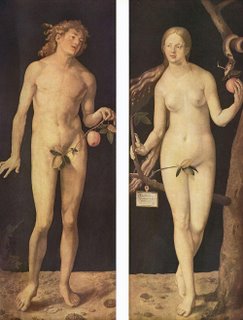 Adam was the first man, made in the image of God and given dominion over all the earth (Genesis 1:26). His name may be variously translated "earth," "dust," or "clay," all of which point to the substance of his making. [A brief digression: Adam may also mean "red." This is akin to "Edom," the later name for Esau, who received the title not because of how he looked at birth (25:25) but because he sold his birthright for the red stew (25:29-34).]
Adam was the first man, made in the image of God and given dominion over all the earth (Genesis 1:26). His name may be variously translated "earth," "dust," or "clay," all of which point to the substance of his making. [A brief digression: Adam may also mean "red." This is akin to "Edom," the later name for Esau, who received the title not because of how he looked at birth (25:25) but because he sold his birthright for the red stew (25:29-34).]Eve was the first woman, formed from one of Adam's ribs to be his companion and helper (2:18-24). Her name seems related to the Hebrew words for "life giver" and "living." Interestingly, however, Adam didn't give her this name until after the Fall.
God placed Adam and Eve in the Garden of Eden to take care of the creation as His stewards, or representatives. But they forsook God's Word, ate the fruit of the one tree of which the Lord had placed off-limits to them, and plunged the world into sin (3:1-7). For this disobedience, God drove them from the Garden. Eve had to suffer the pain of childbirth and be subject to Adam; Adam had to toil amid thorns and thistles and return to the dust of the ground. Our burial rite recalls this curse, as does the traditional sentence pronounced during Ash Wednesday's imposition of ashes: "Remember that you are dust, and to dust you shall return. (Quoted from the LSB Altar Book)"
Despite Adam and Eve's attempt to spite their Creator and make themselves into gods, God promised that the woman's Seed would crush the serpent's head (3:8–24). While sin had entered God's perfect creation, decaying and changing it, God would restore it again through Christ.
Eve is the mother of the human race. Adam not only fathered all mankind but also represents all humanity and the Fall, as St. Paul writes, "For in Adam all die, so also in Christ shall all be made alive. (1 Corinthians 15:22)" The sinful corruption and rebellious natures which we have from conception and birth we sometimes call original (or "birth") sin. It clings to all descendants of Adam, save Jesus. Therefore, we often speak of our sinful natures as the Old Adam.
For some of my personal observations on the First and Second Adams, I invite you to read Temptation: Adam and Adamant. This date for the commemoration was chosen by the The Lutheran Church — Missouri Synod.
Technorati Tags: Adam | Eve | Adam and Eve | The Fall | original sin | temptation | Bible | Old Testament | judgment | dust | sin | grace | Law and Gospel | Law | Gospel | Jesus | Christ | Jesus Christ | Creation
No one has hazarded a guess about the Jack Benny - Lutheran Carnival association. If it's because of disinterest, please continue ignoring this follow-up. If it's because you're stumped, try making a numeric connection.
Technorati Tags: Lutheran Carnival | blog carnival | Lutheran | confessional Lutheran | Jack Benny | Golden Aardvark
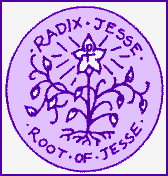 Here follows the third of the O Antiphons with Latin text and English translation, a Latin hymn stanza, and the English versification from the hymn known as Oh, Come, Oh, Come, Emmanuel.
Here follows the third of the O Antiphons with Latin text and English translation, a Latin hymn stanza, and the English versification from the hymn known as Oh, Come, Oh, Come, Emmanuel.O Radix Jesse, qui stas in signum populorum, super quem continebunt reges os suum, quem gentes deprecabuntur; veni ad liberandum nos, iam noli tardere.
O Root of Jesse, which stands for an ensign of the people, before whom the kings keep silence and unto whom the Gentiles shall make supplication: Come, to deliver us, and tarry not. Amen.
"There shall come forth a shoot from the stump of Jesse, and a branch from his roots shall bear fruit." (Isaiah 11:1). "In that day the root of Jesse, who shall stand as a signal for the peoples — of him shall the nations inquire, and his resting place shall be glorious." (Isaiah 11:10). Jesse was the father of King David; Micah prophesied that the Messiah would be of the house and lineage of David and be born in David's city, Bethlehem (Micah 5:2). See also Romans 15:12; Revelation 5:5.
Veni, O Jesse Virgula, Ex hostis tuos ungula,
De spectu tuos tartari Educ et antro barathri.
Oh, come O Rod of Jesse's stem, From ev'ry foe deliver them
That trust Your mighty pow'r to save; Bring them in vict'ry through the grave.
Rejoice! Rejoice! Emmanuel Shall come to you, O Israel!
Read the meditation by Pr. Bill Cwirla.
Scripture quoted from the ESV®
Technorati Tags: Advent | O Antiphons | Oh, Come, Oh, Come, Emmanuel | O Radix Jesse | O Root of Jesse
Jack Benny, famed (and dead) Jewish comedian, actor, and variety show host ... the Lutheran Carnival, not so famous but alive and well at Ask the Pastor ... a special Golden Aardvark to the first, the best, and any other posts deemed worthy by our panel of experts.*
 You ask, "Posts about what?"
You ask, "Posts about what?"I reply, "About what I just said."
"Huh!?"
I respond, "This is a test of your cultural awareness, sense of humor, and writing skills. If you think you have a noteworthy response, write it on your blog as a permanent post and let me know by leaving a comment to this post. In other words, don't answer here; tell me here where you posted your answer.
"Is this all clear to you?"
"Crystal," you reply. "I'll get right on it."**
"I knew you could," Mr. Rogers said.
*That would, of course, be the esteemed association of Me, Myself, and I.
**And this, of course, would be your reply if you have a blog, if you think you know the answer, and if you're at all interested. Otherwise, you've probably quit reading before now.
Technorati Tags: Lutheran Carnival | blog carnival | Lutheran | confessional Lutheran | Jack Benny | Golden Aardvark | Ask the Pastor
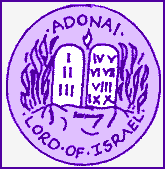 This is the second of the O Antiphons with Latin text and English translation, a Latin hymn stanza, and the English versification from the hymn known as Oh, Come, Oh, Come, Emmanuel.
This is the second of the O Antiphons with Latin text and English translation, a Latin hymn stanza, and the English versification from the hymn known as Oh, Come, Oh, Come, Emmanuel.O Adonai, et dux domus Israel, qui Moysi in igne flammae rubi apparuisti, et ei in Sina legem dedisti: veni ad redimendum nos in brachio extento.
O Lord and Ruler of the House of Israel, who appeared to Moses in the flame of the burning bush and gave him the law on Sinai: come, and redeem us with outstretched arms. Amen.
"With righteousness he shall judge the poor, and decide with equity for the meek of the earth; and he shall strike the earth with the rod of his mouth, and with the breath of his lips he shall kill the wicked. Righteousness shall be the belt of his waist, and faithfulness the belt of his loins." (Isaiah 11:4-5); and "For the Lord is our judge; the Lord is our lawgiver; the Lord is our king; he will save us." (Isaiah 33:22). See also Exodus 3; Micah 5:2; Matthew 2:6.
Veni, Veni, Adonai, Qui populo in Sinai
Legem dedisti vertice In maiestate gloriae.
Oh, come, oh, come, our Lord of might, Who to Your tribes on Sinai's height
In ancient times gave holy law, In cloud and majesty and awe.
Rejoice! Rejoice! Emmanuel Shall come to you, O Israel!
Read the meditation by Pr. Bill Cwirla.
Scripture quoted from the ESV®
Technorati Tags: Advent | O Antiphons | Oh, Come, Oh, Come, Emmanuel | O Adonai | O Lord | O Lord and Ruler of the House of Israel
Today we commemorate the Holy Prophet Daniel and the Three Young Men — Shadrach, Meshach, and Abednego. These four were among the young men of Judah who were taken into captivity in Babylon. Showing promise in leadership positions, their captors elevated them to positions. Even in that strange and foreign land, regardless of persecution or pressure to worship false gods, they remained faithful to the one true God in piety, prayer, and life.
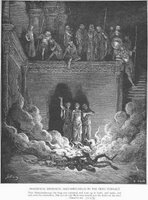 On account of their steadfast faithfulness in the face of pagan idolatry, the Three Young Men were thrown into a fiery furnace, from which they were saved by the Lord and emerged unharmed (Daniel 3). Similarly, Daniel was thrown into a pit of lions, from which he also was saved (Daniel 6).
On account of their steadfast faithfulness in the face of pagan idolatry, the Three Young Men were thrown into a fiery furnace, from which they were saved by the Lord and emerged unharmed (Daniel 3). Similarly, Daniel was thrown into a pit of lions, from which he also was saved (Daniel 6).The canonical text of Daniel only tells us that a fourth person joined the Three Young Men in the furnace and that they were unharmed in the ordeal. Supplemental accounts from the Apocrypha provide insertions between verses 23 and 24 of chapter 3. The Prayer of Azariah and The Song of the Three Young Men are purported accounts of what they sang and prayed while amidst the flames. The latter song entered Jewish and then Christian worship as a canticle of praise. Much of Christendom knows the song by its Latin title and still sings Benedicite Omnia Opera (Bless Him, All You Works [of the Lord]). These verses also inspire hymnists and various metrical works based upon the Benedicite have been written and sung through the years.
Perhaps because of its apocalyptic nature, the book of Daniel inspired not only these two prayers but other "supplemental" writings. Some Bibles insert these various passages into the Masoretic Text while others include some or all of them as separate writings. Of these additions, the two most noted are Susanna and Bel and the Dragon. The former is a tale of moral integrity in the face of sexual blackmail while the latter is a loose collection of stories involving Babylonian gods, a literal beast slain by Daniel, and a different tale of the prophet amidst the lions.
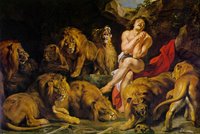 Blessed in all their endeavors by the Lord — and in spite of the hostility of some — Daniel and the Three Young Men were promoted to positions of leadership among the Babylonians (Daniel 2:48-49; 3:30; 6:28). Daniel received special favor from the Lord and was given the ability to interpret the difficult dreams and strange signs that were given to King Nebuchadnezzar and King Belshazzar (Daniel 2, 4-5). To Daniel himself the Lord gave visions of the end times and a picture of "one like a son of man" who "came to the Ancient of Days. (Daniel 7:9-14)" This same imagery returns to Holy Scripture in portions of Revelation.
Blessed in all their endeavors by the Lord — and in spite of the hostility of some — Daniel and the Three Young Men were promoted to positions of leadership among the Babylonians (Daniel 2:48-49; 3:30; 6:28). Daniel received special favor from the Lord and was given the ability to interpret the difficult dreams and strange signs that were given to King Nebuchadnezzar and King Belshazzar (Daniel 2, 4-5). To Daniel himself the Lord gave visions of the end times and a picture of "one like a son of man" who "came to the Ancient of Days. (Daniel 7:9-14)" This same imagery returns to Holy Scripture in portions of Revelation.As an aside, we note that the Babylonians gave new names to some of their captives. Although the book and most references to the prophet use his Hebrew name, Daniel was also known as Belteshazzar. Meanwhile, the Three Young Men are normally referred to by their captive names of Shadrach, Meshach, and Abednego. Their Hebrew names were, respectively, Hananiah, Mishael, and Azariah.
Technorati Tags: Daniel | Book of Daniel | fiery furnace | Shadrach, Meshach, and Abednego | Song of the Three Young Men | Prayer of Azariah | Bel and the Dragon | Susanna | Benedicite | Benedicite Omnia Opera | Judah | Israel | prophecy | Messianic prophecy | Law and Gospel | Bible | Old Testament | apocalyptic
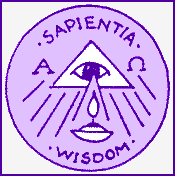 This is the first of the O Antiphons with Latin text and English translation, a Latin hymn stanza, and the English versification from the hymn known as Oh, Come, Oh, Come, Emmanuel.
This is the first of the O Antiphons with Latin text and English translation, a Latin hymn stanza, and the English versification from the hymn known as Oh, Come, Oh, Come, Emmanuel.O Sapientia, quae ex ore Altissimi prodiisti, attingens a fine usque ad finem fortiter, suaviterque disponens omnia: veni ad docendum nos viam prudentiae.
O Wisdom, who came from the mouth of the Most High, reaching from end to end and ordering all things mightily and sweetly: come, and teach us the way of prudence. Amen.
"And the Spirit of the Lord shall rest upon him, the Spirit of wisdom and understanding, the Spirit of counsel and might, the Spirit of knowledge and the fear of the Lord. And his delight shall be in the fear of the Lord." (Isaiah 11:2-3), and "This also comes from the Lord of hosts; he is wonderful in counsel and excellent in wisdom." (Isaiah 28:29). See also Proverbs 1:20; Proverbs 8-9 and 1 Corinthians 1:30.
Veni, O Sapientia, Quae hic disponis omnia,
Veni, viam prudentiae Ut doceas et gloriae.
Oh, come, our Wisdom from on high, Who ordered all things mightily;
To us the path of knowledge show, And teach us in her ways to go.
Rejoice! Rejoice! Emmanuel Shall come to you, O Israel!
You are invited to read the meditation written by Pr. Bill Cwirla.
Scripture quoted from the ESV®
Technorati Tags: Advent | O Antiphons | Oh, Come, Oh, Come, Emmanuel | O Sapientia | O Wisdom | O Wisdom from on High
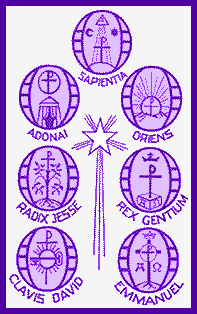 We count down the final days of Advent using the traditional monastic antiphons to the Magnificat. Most of English speaking Christendom knows these antiphons through their versification, Oh, Come, Oh, Come, Emmanuel. Beginning in eternity, the antiphons follow a rough chronology through history until the coming of Emmanuel, "God with Us." Thus, the first stanza that we normally sing of the hymn is actually the last of the antiphons, sung on 23 December. By Vespers on the 24th, it's time to remove the final vestiges of Advent and enter into Christmas.
We count down the final days of Advent using the traditional monastic antiphons to the Magnificat. Most of English speaking Christendom knows these antiphons through their versification, Oh, Come, Oh, Come, Emmanuel. Beginning in eternity, the antiphons follow a rough chronology through history until the coming of Emmanuel, "God with Us." Thus, the first stanza that we normally sing of the hymn is actually the last of the antiphons, sung on 23 December. By Vespers on the 24th, it's time to remove the final vestiges of Advent and enter into Christmas.The order itself, whether by design or coincidence, forms a Latin reverse acrostic. The initial address for the coming Savior in each antiphon is as follows: Sapientia, Adonai, Radix, Clavis, Oriens, Rex, and Emmanuel. Taking each title's first letter and writing the result backwards yields "ero cras"; normally this is rendered, "I shall be [with you] tomorrow." Thus our Lord promises to return for us and so He leads us to pledge to join together in His worship while still on earth.
Through each of the next seven days, I hope to post the appropriate antiphon, its translation, the Latin versification, and the corresponding hymn stanza from Lutheran Worship. As each day is added, I'll link to it below.
Posts in the Series:
† O Sapientia — O Wisdom
† O Adonai — O Lord and Ruler
† O Radix Jesse — O Root of Jesse
† O Clavis David — O Key of David
† O Oriens — O Dayspring
† O Rex Gentium — O King of the Nations
† O Emmanuel — O God with Us
Technorati Tags: Advent | O Antiphons | Oh, Come, Oh, Come, Emmanuel | Magnificat
I caught most of the three nights' broadcasts, although dinner time and helping Little Aard with homework and studying for finals kept me at times from full focus. My anticipation was rewarded: The show stayed as offbeat through the 2nd and 3rd nights as it started on the first. At the same time, Lost Room never violated its own internal logic.
But because I missed some portions and I didn't quite understand or focus upon others, I'm happy to see that all six hours are scheduled for this Sunday on SciFi. And if you missed some or all of it — especially if what you've heard from others has you wondering — consider recording or watching it Sunday afternoon 17 December from 5 to 11 p.m. Eastern Time (4-10 p.m. CST).
If you've already seen it, please don't leave any spoiler comments (positive or negative) until later on Sunday.
All in favor, say, "Eye."
Technorati Tags: The Lost Room | SciFi Channel | science fiction | television | TV

